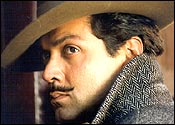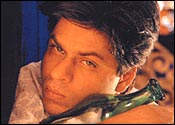
|
Devdas Vs Bhagat Singh
Who is the better man?
|
Deepa Gahlot
It is one of those strange quirks of showbiz that at a time when there is a lack of a real role model kind of hero in Hindi films, two characters who are about to capture the audiences' attention (if not necessarily their money) are so dramatically different from each other --- Devdas and Bhagat Singh.
At one end of the spectrum is Devdas (the eponymous hero of Saratchandra Chattopadhyay's 1917 Bengali novel), who would, by today's standards be considered a loser and a wimp. He does not have the courage to defy his family for Paro, the woman he loves. Paro takes courage into her hands and comes to him, pleading with him to marry her and he refuses. Then he drowns himself in alcohol, wallowing in guilt and self-pity.
Later beautiful courtesan Chandramukhi falls in love with him and gives up everything for him. But Devdas obviously cannot offer her anything in return. He finally dies at Paro's doorstep. For the rigid and repressive times he lived in, Devdas' drinking himself to death may have been considered a form of rebellion, and young people then emulated Dilip Kumar's doomed look.
Today a hero like that would be laughed out of the cinemas --- audiences watching Shakti Samanta's Devdas in a Mumbai multiplex guffawed as if it were a comedy. One can see why Sanjay Leela Bhansali needs to garnish his version with crores worth of zardozi glitter.
More than the passive Devdas who just lies back and allows himself to be worshipped by two women, the heroines of the film have stronger spines and more dignity, considering the oppressively patriarchal society they lived in.
 Bhagat Singh's self-destructiveness was of a more active kind as it were. He brushed aside Gandhi's non-violence tenets and like others in his group believed in violent resistance to colonial rule. It is as if he courted arrest and death so that his message of revolution could reach the people. History lionised Gandhi and turned Bhagat Singh into a footnote. But folklore and legend kept his legacy alive.
Bhagat Singh's self-destructiveness was of a more active kind as it were. He brushed aside Gandhi's non-violence tenets and like others in his group believed in violent resistance to colonial rule. It is as if he courted arrest and death so that his message of revolution could reach the people. History lionised Gandhi and turned Bhagat Singh into a footnote. But folklore and legend kept his legacy alive.
Films about Bhagat Singh invariably focus on his fiery bravado, not much on his scholarship or communist ideology. Young people today are more likely to be attracted to his larger-than-life passion for a cause. His death (in 1931) was tragic. In terms of larger political implications, it was quite in vain, but the fact that decades later five filmmakers think it is worth telling his story shows that they believe people still want to listen.
Both Devdas and Bhagat Singh died in their twenties, one killed himself for the love of a woman, one was killed for the love of his country. The heartbreaking romanticism of both storied cannot be denied, but today, Bhagat Singh comes across as a real hero, a representative of a robust agrarian class, while Devdas as a soft weakling, a representative of a decadent feudal system. Pare them down to the core, and both appear to have a mutinous souls. Both fight in whatever way they can.
"Our dharma is to swallow our anger, abide by the discipline of non-violence and carry out our duty," Gandhi had said while decrying Bhagat Singh's violent battle against the British. Neither Devdas nor Bhagat Singh followed Gandhi's dharma, they both stand for the revolt of youth against the established order --- but using different methods.
What would have happened if the two had not died young. Devdas (though a fictional character) would either have frittered away his inheritance on drink and died a pauper a few years later, or he would have been redeemed by the love of a good woman, and gone back to his comfortable zamindar's existence, probably turning into a more ill-tempered version of his imperious father. There are several instances of Devdas' temper in the novel, but no indication of his being a man of action, so there is little chance of his becoming a revolutionary or social reformer.
If Bhagat Singh had been spared the gallows in 1931, he would have rotten away in jail, or been released in 1947 and either become a politician to cash in on his sacrifice, or would have been marginalised by the bunch of self-serving leaders who took over the reins after Independence.
 In their premature deaths lies their heroism, in dying young they were spared fates worse than death - oblivion, contempt of their peers, ordinariness, self-loathing.
In their premature deaths lies their heroism, in dying young they were spared fates worse than death - oblivion, contempt of their peers, ordinariness, self-loathing.
So who is more relevant to our times, Devdas or Bhagat Singh? Sadly neither. A moribund Indian society needs active people who can root for change, not sentimental alcoholics. But already reeling under violence and misguided nationalism, Indians don't need more sloganeering and shedding of young blood.
When it comes to cinema, one would be inclined to vote for Bhagat Singh. It's far more inspiring to watch a guy who has a point of view, a mission and the guts to go after his dream, rather than a vain, self-obsessed drifter. What we need really is the delicate poetic romance of Devdas, and the ideological fervour of Bhagat Singh - but both channelised positively to meaningful purpose. And, needless to add, more exciting cinema.
Earlier column
E-mail Deepa Gahlot